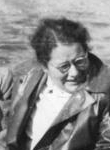Related Research Articles
Noel Haviland Field was an American communist activist, diplomat and spy for the NKVD, whose activities before and after World War II allowed the Eastern Bloc to use his name as a prosecuting rationale during the 1949 Rajk show trial in Hungary, as well as the 1952 Slánský show trial in Czechoslovakia.

Helmut Müller-Enbergs is a German political scientist who has written extensively on the Stasi and related aspects of the German Democratic Republic's history.
Andreas Herbst is a German historian. His career has been divided between authorship and museum work. He has written extensively on aspects of the German Democratic Republic and since 2001 has worked for the German Resistance Memorial Center in Berlin.

Bert Heller was a German painter and illustrator who for two years in the later 1950s served as Rector of the Fine Arts Academy in the Weissensee district of Berlin. Heller‘s reputation as an artist is based primarily on his portraits, water colours and posters.
Günter Benser is a German Marxist historian. Before 1989 he was a senior staff member of the Berlin-based Marxism–Leninism Institute attached to the ruling Socialist Unity Party of (East) Germany, and serving as its director for not quite two and a half eventful years, starting on 21 December 1989.
Irene Runge is an American-German-Jewish sociologist, writer and commentator.
Paula Acker was a German correspondent, journalist and newspaper editor. She was also an activist and officer of the Communist party and of its East German successor, the Socialist Unity Party .

Horst Pehnert was an East German journalist and party official who in 1976 became a long-standing deputy Minister for Culture - effectively the minister for film and cinema.

Margarete "Grete" Wittkowski was a German economist and politician. Between 1961 and 1967 she served as deputy chair of the East German Council of Ministers, the only woman ever to hold this post. Between 1967 and 1974, she served as President of the East German National Bank.
Leiva Petersen was a German classical philologist and publisher.

Stefan Wolle is a German historian. A focus of his socio-historical research is on the German Democratic Republic which is where, before reunification, he lived and worked.
Käthe Dahlem was a German political activist who, after being forced into exile, became an anti-fascist Resistance activist, participating in the Spanish Civil War and, subsequently, again based in France. After 1945 she became a public official in the Soviet occupation zone. She was retired on health grounds in July 1949 and was subsequently caught up in her husband's difficulties with the ruling party, the party first secretary, Walter Ulbricht and other leading party comrades who had spent the war years in Moscow. By the 1960s, however, the authorities were happy to honour her pre-war and wartime contribution.
Lucie Hein was an East German politician (SED). Between 1960 and 1965 she served as the senior mayor of Frankfurt.
Lothar Berthold was an East German Marxist-Leninist historian, university teacher and publisher. He was also an official of the country's ruling Socialist Unity Party . During the 1960s he was a member of the politburo's "Ideology Commission", widely regarded as one of the most committed and effective propagandists among East Germany's mainstream academic historians. His publications and political engagement after reunification reflected a continuing commitment to East German-style communism.

Dietmar Keller was an East German politician (SED/PDS) who served as Minister for Culture in the Modrow government. After reunification he sat as a member of the German parliament ("Bundestag") between 1990 and 1994.
Wolfram Heicking is a German composer, musicologist and music academy professor.

Rita Schober was a German scholar of Romance studies and literature.
Walter Beling was a German political activist and party official (KPD) who became a resistance activist during the Hitler years. He was released from prison, possibly due to an administrative error, in 1936 and fled the country. He spent much of his time during the war in the so-called "free zone" of occupied France. He returned to occupied Germany in November 1945 and took over as editor-in-chief at the Berliner Rundfunk. A succession of senior political appointments followed till 1950 when, like many senior party officials at around the same time, he abruptly fell from favour. He was grudgingly more or less rehabilitated in 1956, and at one point transferred to the Foreign Ministry: he undertook a diplomatic posting in Geneva between 1959 and 1965 as East Germany's permanent representative to the United Nations Economic Commission for Europe.
The Wochenpost was an East German weekly. It was founded in 1953, and circulation peaked at over one million copies per issue from 1971 to the German reunification. The academic Deirdre Byrnes writes that the paper was "one of the most influential" publications in East Germany. Its highest circulation was around 1.2 million copies, making the paper the most popular weekly in East Germany. It was considered a paper for intellectuals.

Willi Brundert was a German politician. He served in several political roles in the Soviet occupation zone of Germany from 1946 until his arrest and imprisonment in 1950. After being released from prison in 1957, Brundert relocated to the state of Hesse in West Germany, where he served in the state parliament and as Mayor of Frankfurt-am-Main from 1964 until his death in 1970.
References
- 1 2 "Angaben zum ... Bernd-Rainer Barth". Bundesstiftung zur Aufarbeitung der SED-Diktatur: Biographische Datenbanken. Retrieved 20 October 2014.
- ↑ Bernd-Rainer Barth, Werner Schweizer (Ed), Thomas Grimm: Der Fall Noel Field. Basisdruck, Berlin 2006 ISBN 3861631377